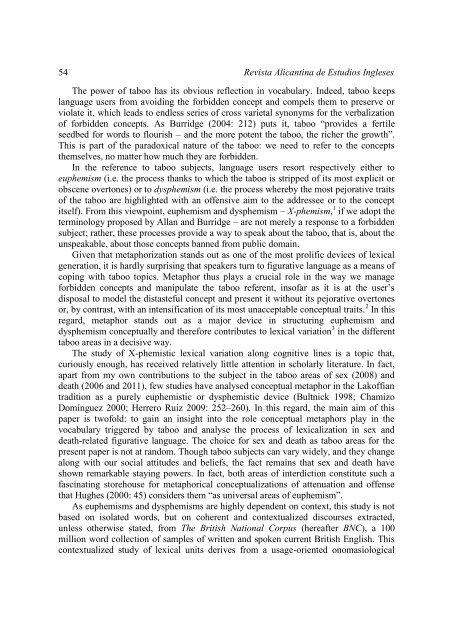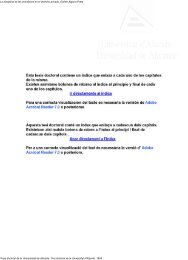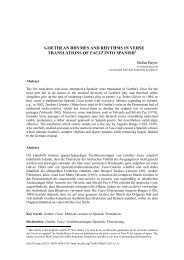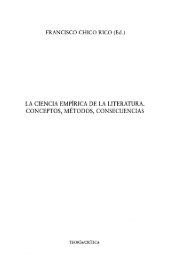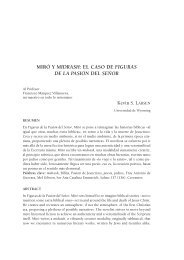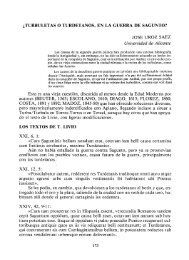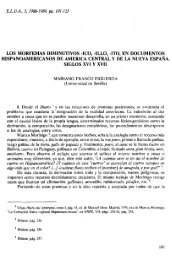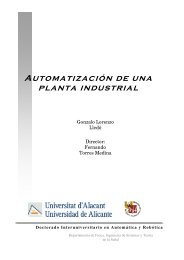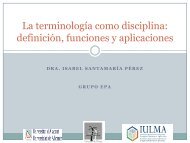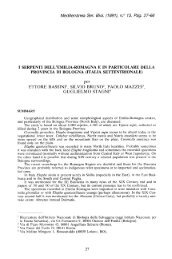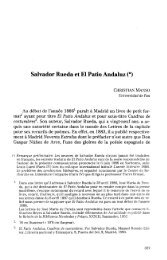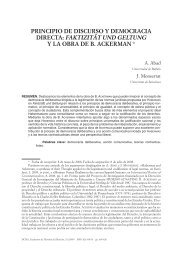Conceptual Metaphors in Taboo-Induced Lexical Variation
Conceptual Metaphors in Taboo-Induced Lexical Variation
Conceptual Metaphors in Taboo-Induced Lexical Variation
Create successful ePaper yourself
Turn your PDF publications into a flip-book with our unique Google optimized e-Paper software.
54 Revista Alicant<strong>in</strong>a de Estudios Ingleses<br />
The power of taboo has its obvious reflection <strong>in</strong> vocabulary. Indeed, taboo keeps<br />
language users from avoid<strong>in</strong>g the forbidden concept and compels them to preserve or<br />
violate it, which leads to endless series of cross varietal synonyms for the verbalization<br />
of forbidden concepts. As Burridge (2004: 212) puts it, taboo “provides a fertile<br />
seedbed for words to flourish – and the more potent the taboo, the richer the growth”.<br />
This is part of the paradoxical nature of the taboo: we need to refer to the concepts<br />
themselves, no matter how much they are forbidden.<br />
In the reference to taboo subjects, language users resort respectively either to<br />
euphemism (i.e. the process thanks to which the taboo is stripped of its most explicit or<br />
obscene overtones) or to dysphemism (i.e. the process whereby the most pejorative traits<br />
of the taboo are highlighted with an offensive aim to the addressee or to the concept<br />
itself). From this viewpo<strong>in</strong>t, euphemism and dysphemism – X-phemism, 1 if we adopt the<br />
term<strong>in</strong>ology proposed by Allan and Burridge – are not merely a response to a forbidden<br />
subject; rather, these processes provide a way to speak about the taboo, that is, about the<br />
unspeakable, about those concepts banned from public doma<strong>in</strong>.<br />
Given that metaphorization stands out as one of the most prolific devices of lexical<br />
generation, it is hardly surpris<strong>in</strong>g that speakers turn to figurative language as a means of<br />
cop<strong>in</strong>g with taboo topics. Metaphor thus plays a crucial role <strong>in</strong> the way we manage<br />
forbidden concepts and manipulate the taboo referent, <strong>in</strong>sofar as it is at the user’s<br />
disposal to model the distasteful concept and present it without its pejorative overtones<br />
or, by contrast, with an <strong>in</strong>tensification of its most unacceptable conceptual traits. 2 In this<br />
regard, metaphor stands out as a major device <strong>in</strong> structur<strong>in</strong>g euphemism and<br />
dysphemism conceptually and therefore contributes to lexical variation 3 <strong>in</strong> the different<br />
taboo areas <strong>in</strong> a decisive way.<br />
The study of X-phemistic lexical variation along cognitive l<strong>in</strong>es is a topic that,<br />
curiously enough, has received relatively little attention <strong>in</strong> scholarly literature. In fact,<br />
apart from my own contributions to the subject <strong>in</strong> the taboo areas of sex (2008) and<br />
death (2006 and 2011), few studies have analysed conceptual metaphor <strong>in</strong> the Lakoffian<br />
tradition as a purely euphemistic or dysphemistic device (Bultnick 1998; Chamizo<br />
Domínguez 2000; Herrero Ruiz 2009: 252–260). In this regard, the ma<strong>in</strong> aim of this<br />
paper is twofold: to ga<strong>in</strong> an <strong>in</strong>sight <strong>in</strong>to the role conceptual metaphors play <strong>in</strong> the<br />
vocabulary triggered by taboo and analyse the process of lexicalization <strong>in</strong> sex and<br />
death-related figurative language. The choice for sex and death as taboo areas for the<br />
present paper is not at random. Though taboo subjects can vary widely, and they change<br />
along with our social attitudes and beliefs, the fact rema<strong>in</strong>s that sex and death have<br />
shown remarkable stay<strong>in</strong>g powers. In fact, both areas of <strong>in</strong>terdiction constitute such a<br />
fasc<strong>in</strong>at<strong>in</strong>g storehouse for metaphorical conceptualizations of attenuation and offense<br />
that Hughes (2000: 45) considers them “as universal areas of euphemism”.<br />
As euphemisms and dysphemisms are highly dependent on context, this study is not<br />
based on isolated words, but on coherent and contextualized discourses extracted,<br />
unless otherwise stated, from The British National Corpus (hereafter BNC), a 100<br />
million word collection of samples of written and spoken current British English. This<br />
contextualized study of lexical units derives from a usage-oriented onomasiological


